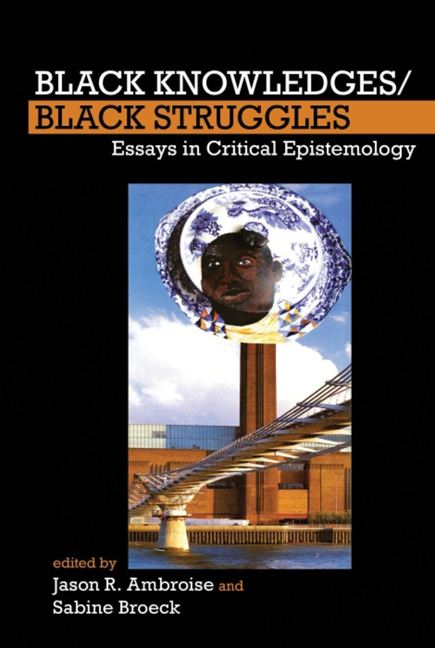Book contents
- Frontmatter
- Contents
- List of Figures
- List of Contributors
- 1 Black Knowledges/Black Struggles: An Introduction
- 2 “Come on Kid, Let's Go Get the Thing”: The Sociogenic Principle and the Being of Being Black/Human
- 3 Respectability and Representation: Black Freemasonry, Race, and Early Free Black Leadership
- 4 Ethno-Class Man and the Inscription of “the Criminal”: On the Formation of Criminology in the USA
- 5 Dehumanization, the Symbolic Gaze, and the Production of Biomedical Knowledge
- 6 Performing Scientificity: Race, Science, and Politics in the USA and Germany after the Second World War
- 7 Imaginary Black Topographies: What are Monuments For?
- 8 The Ceremony Found: Towards the Autopoetic Turn/Overturn, its Autonomy of Human Agency and Extraterritoriality of (Self-)Cognition
- Works Cited
- Index
5 - Dehumanization, the Symbolic Gaze, and the Production of Biomedical Knowledge
- Frontmatter
- Contents
- List of Figures
- List of Contributors
- 1 Black Knowledges/Black Struggles: An Introduction
- 2 “Come on Kid, Let's Go Get the Thing”: The Sociogenic Principle and the Being of Being Black/Human
- 3 Respectability and Representation: Black Freemasonry, Race, and Early Free Black Leadership
- 4 Ethno-Class Man and the Inscription of “the Criminal”: On the Formation of Criminology in the USA
- 5 Dehumanization, the Symbolic Gaze, and the Production of Biomedical Knowledge
- 6 Performing Scientificity: Race, Science, and Politics in the USA and Germany after the Second World War
- 7 Imaginary Black Topographies: What are Monuments For?
- 8 The Ceremony Found: Towards the Autopoetic Turn/Overturn, its Autonomy of Human Agency and Extraterritoriality of (Self-)Cognition
- Works Cited
- Index
Summary
The fundamental philosophical postulate of modern medicine is that the body and its function can be understood in terms of physical chemistry, that living organisms are physico-chemical machines and the ideal of the physician is to become an engineer of the body.
Franz Alexander, “Psychological Aspects of Medicine” (1939)What are by common consent called the human sciences have their own drama […] The only possibility of regaining one's balance is to face the whole problem, for all these discoveries, all these inquiries lead only in one direction: to make man admit that he is nothing, absolutely nothing – and that he must put an end to the narcissism on which he relies in order to imagine that he is different from the other “animals.” […] I grasp my narcissism with both hands and I turn my back on the degradation of those who would make man a mere [machine]. […] And truly what is to be done is to set man free.
Frantz Fanon, Black Skin, White Masks (1967): 22–23All in all, scientific knowledge counts, measures, classifies and kills. But it is not enough to say that scientific knowledge is summary. We must add that it is impoverished and half-starved. To acquire it, mankind has sacrificed everything: desires, fears, feelings, psychological complexes. To acquire the impersonality of scientific knowledge mankind depersonalized itself, deprived itself of individuality. An impoverished knowledge, I say, for at its inception – whatever may be its riches beside – stands an impoverished humanity.
Aimé Césaire, “Poetry and Knowledge” (1946): xliiThe news was neither novel nor surprising, as many learned when the story broke in early October, 2010, that in the 1940s researchers from the United States Public Health Service (USPHS) led by Dr. John C. Cutler had intentionally infected nearly 1,500 prisoners, orphans, disabled persons, and soldiers in Guatemala with syphilis, gonorrhea and chancroid in order to test the efficacy of penicillin as a cure (Reverby, 2011). Out of those purposefully infected, fewer than 700 actually received any penicillin. There were at least eighty-three deaths, as well as untold numbers of persons who died prematurely due to their untreated illness (Stein, 2010).
- Type
- Chapter
- Information
- Black Knowledges/Black StrugglesEssays in Critical Epistemology, pp. 112 - 144Publisher: Liverpool University PressPrint publication year: 2015



